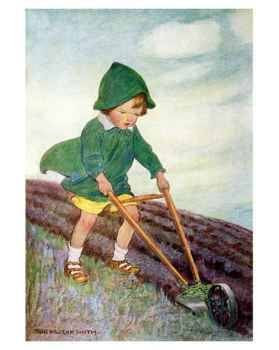
Double Exposure of Human Eye and Sunset
Photographic Print
I have a sneaking suspicion that as I grow older, the observation skills that I have honed over the last 50+ years are in danger of stagnating. I see almost nothing that surprises or shocks me anymore; and the possibility of taking for granted the beauty all around becomes very real. Young children are a tonic for this; their contagious wonder when they witness a sunrise, a bumblebee, a rainbow~~ reawakens the inner eye that has grown sleepy.
Acute observation skills are not developed by chance, and once developed, it takes real effort to maintain the practice of looking deeply. The British educator, Charlotte Mason, emphasized observation skills as a way of life and felt that this skill was an important educational underpinning.
Nature observations were central to her method of exercising visual acuity. Miss Mason encouraged Mothers to spend long hours outdoors with the children, guiding them to see not just trees, but trees with unique characteristics. Children were challenged not only to notice the distinctives of each tree, the shape of the leaves, the texture of the bark, the type of seeds, etc.-- but to make these discoveries ON THEIR OWN. In other words, Mom was to pique their curiosity and stimulate them to make their own discoveries.
Alas, children don't keep. In their absence, one can grow rusty about noticing the little things: the street sign that says "2th" instead of "2nd", the heart-shaped branch on the tree, and the sparkle of frost on the window pane. And have you noticed that there is a white arrow on the Federal Express truck? No, I didn't notice this myself. I read it in this
fascinating article called
The Eyes Have It, about a Harvard educator named Professor Stilgoe, a man that would make Charlotte Mason proud.
If you, like me, have never noticed the white arrow on the truck, Stilgoe proposes a reason:
"It's because your eyes and your brain have been conditioned to read the letters. Before they've learned to read, toddlers will see the arrow. And I've asked toddlers, ‘Do you see the arrow on the truck?’ And they usually do,” says Stilgoe. “The arrow is between the lower half of the capital E, and the X." He goes on to say that most people stop looking after they learn to read. It seems almost heretical to mention any downside to reading, doesn't it? But there you have it.
The failure to notice the Fed X arrow may not be such a bad thing. After all, a mind has to sift out the minutiae that is less-than-essential or else our thoughts are clogged and cluttered. But, I wonder, could I also be editing out details that would make for my delight? How can I combat my own visual illiteracy? Is there a way I can encourage my kids to develop skills of acute observation?
Stilgoe's suggestions are pretty common sense. Truth be known, I need to be reminded of them often, suggestions such as:
- Slow down the pace of life. Meander. Don't go on a walk just for your health, but also for delectation. Go for a ride once in a while without a destination in mind, and enjoy the view.
- Don't be afraid of being slightly disorganized. Spontaneity can invite fresh experiences and new scenery.
- Make sure the children have plenty of "self-guided, non-organized activity, non-sports activity". (Charlotte Mason called this masterly inactivity).
In thinking on these suggestions, I would add the following:
- Writing or sketching my observations enables me to slow down, notice more detail, and savor the moment. Our state university has introduced sketching into their medical training. Doctors in training must draw the expressions on the faces of their patients. They begin to recognize facial expressions associated with pain, fear, anxiety because they have slowed down long enough to observe telltale details.
- Draw from the examples of master teachers who have achieved great things. Louis Agassiz comes to mind, along with the famous story of his method of teaching a student how to really observe a fish. It's worth a re-read and it's online here. (Scroll down to chapter IV).
- Marry a slow-paced man. I did! Sometimes it drives me crazy, as when we are hurrying to be late. But usually I am blessed. When given a choice, my husband will nearly always choose the scenic route and I am richer for it.
- Stilgoe's phrase "slight disorganization" intrigues me. The push, push, push for productivity that affects us all calls for super-organizational skills. The problem is, when smugly organized, I get irate when my tidy little world gets mussed. The solution is to be organized just enough. Slight disorganization will leave some margin in our lives for serendipity, one of my favorite words!
- Leaving time for the children to have non-guided, non-sports activities is pure wisdom. I am finding that this was easier when they were wee little tots. As they get older, I have to have jealous vigilance if there is to be any margin of white space in our schedules. Time will tell, I hope, that it has been worth the struggle.










